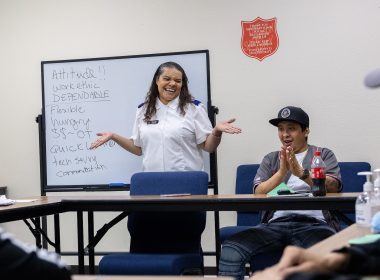by Clifton Shaw, General
On Feb. 15, 2006, then General-Elect Commissioner Shaw Clifton delivered the following speech to the Three Faiths Forum in London. For over 10 years, the forum has worked to encourage dialogue and confront prejudice, with the objective of building lasting relationships between people of different faiths, cultures and communities. On Dec. 1, 2009, it received an official commendation at the Awards for Bridging Cultures. For more information, visit www.threefaithsforum.org.uk.
I see the relationships between members of different faiths as being somewhat akin to the relationships between members of the different Christian churches. Ecumenism within Christianity offers some parallels for inter-faith dialogue and understanding.
What are these? I will mention four:
1. The importance of never caricaturing the tradition to which you do not belong.
2. The importance of making the intellectual effort (and thus the effort of time) required to gain at least a basic understanding of that other tradition.
3. The importance of being sure of your own tradition and your place in it, never yielding to the temptations of triumphalism.
4. The importance of being open to lasting personal friendships across faith boundaries, so that even if you cannot accept fully the beliefs of another tradition, you can trust in strong personal friendship another member, or other members, of that tradition.
In my days as a law student at King’s College, University of London, my best pal was Jewish. Our friendship was triggered by our mutual dislike of frequenting “beery,” “smoky” places for lunch! We became very good friends, visiting one another’s homes and spending much time together. I find it exceedingly interesting, therefore, to notice that our youngest son, John, now also in his first year at university, has found as his bosom pal a young Iraqi Muslim. They study, eat, laugh and enjoy leisure time together. John has chosen to be a committed Salvationist, wearing a uniform on Sundays and playing in his local Salvation Army band. He has, however, lived on four continents and hence is very open to people of cultures other than his own.
My wife, Helen, and I have lived now on five continents. Five years have been spent in the Islamic Republic of Pakistan. John shared that experience with us. What did we learn there? We learned enough to deepen our respect for the faith of Islam, though we could not possibly claim to be experts. We learned:
– that Islam is denominationalized, just like Christianity;
– that a devout Muslim life is a beautiful thing to behold;
– the daily reminder that Christians are not the only ones who give pride of place to a holy book and to prayer;
– that the extremist face of Islam is as unattractive as the extremist face of Christianity, or of any other religion;
– that if you wish to win respect as a non-Muslim, you had better not water down your own faith or display ignorance of it;
– that as a Salvationist I held in common with Muslim friends many of our values on morality, not least on issues of family life, marriage, and sexuality;
– that it was possible to see our own Western culture, to some extent through Muslim eyes, revealing something of its shallowness and tawdriness;
– that many Muslims mistakenly equate “western” with “Christian,” thereby reaching and holding a false picture of the faith that has shaped my life;
– that my own picture of Islam is probably just as false in certain respects, and that I need to go on learning.
We came to see also that all the great religious faiths of the world face common challenges. Let me refer to a few of these:
1. The challenge of the post-modern age. We live at a time in the west when many reject all organized religion. They seek spirituality but want nothing to do with “church,” “mosque,” or “synagogue.” Sometimes they will attend, but do not want to belong. I would be interested in hearing from Muslim and Jewish friends here today as to whether or not this is a shared experience of us all these days. Are we seeing an historic shift, or a merely generational trend that will eventually pass?
2. The challenge of secularism. This is partly related to the post-modern issue just mentioned, but is different in that it involves an outright rejection, not only of organized religion, but of any belief in God. It says to us that the fastest growing religion of our age is “no religion” and that humankind can manage quite well alone, thank you.
3. The challenge of so-called fundamentalism. I have been intrigued to notice of late, in response to violence carried out in the name of Islam, an attitude being expressed openly and in public which is similar to that commonly heard in Christian circles in response to so-called Christian violence. Take, for example, the violent actions of the IRA and other like bodies in Northern Ireland in recent decades. While these are often claimed to be in the name of a religious persuasion (usually Roman Catholicism opposed to Protestantism, or vice versa), most devout Christians cannot accept that such actions have anything at all to do with Christianity properly understood. We are now hearing that same response in some Muslim circles, and statements telling us that the violence is decidedly un-Islamic. This is to be welcomed
In conclusion of this short address, let me say that as a Salvationist, and as I stand upon the threshold of taking up the leadership of The Salvation Army throughout the world—a task thrust upon reluctant shoulders—I am deeply committed to my own faith as a Christian and to that part of the Christian body known as Salvationism.
Our Founder, General William Booth, taught us never to offer negative comment upon the adherents or the beliefs of other faiths. Instead he urged Salvationists to be ready to explain their own beliefs in an irenic spirit. This is still our overall approach in the 111 countries where we witness, work and serve.
I confess readily that many of our fellow-Christians find us a little odd and unorthodox. So we will forgive our Jewish and our Muslim friends if they too struggle to get inside our worldview. However, I am equally committed to the ever-present work of deepening our understanding of the other great faiths of the world and of forming lasting friendships across faith boundaries. Being with you all today helps me in that endeavour and I thank you again for inviting me.
May God bless you all.







